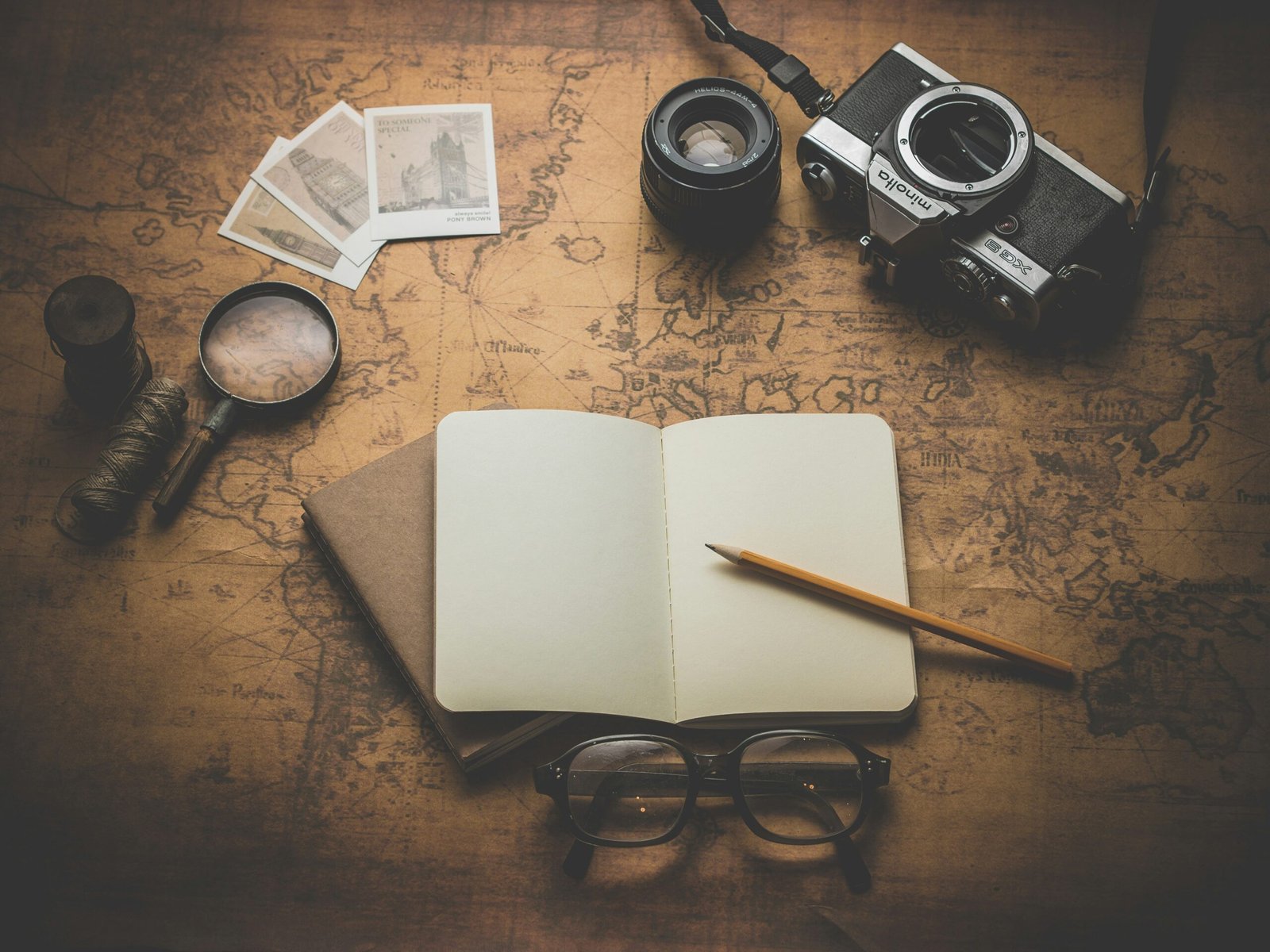Introduction to the Inspirational Power of Travel
Traveling has long been recognized as a powerful source of inspiration. It serves as a rejuvenating force for the mind, offering a break from the monotony of daily routines. This change of scenery and pace can significantly spark creativity, encouraging new ways of thinking and problem-solving. When one travels, the exposure to diverse cultures, landscapes, and experiences provides a wealth of new perspectives that can influence various aspects of life.
Personal growth is one of the most profound impacts of travel. Stepping out of one’s comfort zone and navigating unfamiliar environments builds resilience and confidence. These experiences foster a deeper understanding of oneself and the world, leading to enhanced self-awareness and empathy. The challenges encountered during travel, whether linguistic barriers or navigating new cities, often translate into valuable life skills.
In the realm of artistic endeavors, travel serves as a rich source of inspiration. Artists, writers, and musicians have historically drawn from their travel experiences to create masterpieces. The unique sights, sounds, and stories encountered on the road can ignite the imagination, leading to innovative and compelling works of art. The diversity and beauty of new surroundings often provide a fresh palette of ideas and emotions to explore.
Professionally, travel can also be incredibly beneficial. Exposure to different business practices, work cultures, and networking opportunities can lead to significant professional development. Understanding global markets and cultural nuances can enhance one’s ability to navigate the increasingly interconnected world. Moreover, the problem-solving and adaptability skills honed through travel are highly valued in any professional setting.
Overall, the inspirational power of travel cannot be understated. It serves as a catalyst for personal growth, artistic innovation, and professional advancement. By venturing beyond the familiar, individuals not only rejuvenate their minds but also enrich their lives with new knowledge, perspectives, and experiences.
Exposure to New Cultures and Traditions
Traveling serves as a gateway to immerse oneself in the rich tapestry of diverse cultures and traditions that shape our world. By stepping out of familiar environments, individuals encounter unique ways of life, ranging from everyday customs to grand festivals. Such experiences offer a deeper understanding of how different societies operate, fostering appreciation and respect for cultural diversity.
Engaging with local customs and traditions while traveling can significantly impact one’s worldview. For instance, partaking in traditional ceremonies or festivals provides firsthand experience of the values and beliefs that underpin a culture. Whether it is the vibrant colors of India’s Holi festival, the solemnity of Japan’s tea ceremonies, or the communal spirit of Spain’s La Tomatina, these events offer profound insights into the collective psyche of the communities that celebrate them.
Moreover, the culinary aspect of travel cannot be overlooked. Sampling local cuisines introduces travelers to new flavors and cooking methods, reflecting the region’s history and resources. From savoring the rich spices of Thai street food to enjoying the delicate balance of Italian pasta dishes, food becomes a narrative of cultural heritage. Such gastronomic adventures not only delight the palate but also tell stories of tradition, migration, and innovation.
Exposure to different ways of life also challenges preconceived notions and stereotypes. Interacting with locals and observing their day-to-day activities helps dismantle misconceptions and fosters empathy. Travelers often find that despite cultural differences, there are universal human experiences and emotions that connect us all. This realization can lead to a more inclusive and open-minded perspective, encouraging individuals to reconsider their own cultural biases.
In essence, traveling is a powerful tool for cultural education and personal growth. By embracing the diversity of traditions and lifestyles encountered on their journeys, travelers can broaden their horizons, enrich their understanding of the world, and cultivate a more inclusive mindset.
Meeting New People and Building Connections
Traveling is a catalyst for meeting new people and building connections that can be profoundly inspirational. Interacting with locals and fellow travelers opens up new perspectives, fosters mutual understanding, and often leads to lasting friendships. These encounters can sometimes be serendipitous, yet they leave an indelible mark on one’s journey.
Consider the experience of a solo traveler in a bustling market in Marrakech. Struggling with the language barrier, they are approached by a local vendor who not only assists with translations but also offers insights into the cultural significance of the products on display. This simple interaction evolves into a meaningful conversation about shared values and aspirations, culminating in an invitation to a family dinner. Such experiences underscore the human capacity for kindness and connection, transcending cultural and linguistic differences.
Similarly, the shared experiences among fellow travelers create a unique bond. Whether it’s an impromptu trek through the Himalayan mountains or a cooking class in Tuscany, these activities bring people together in ways that are both enriching and memorable. For instance, two travelers who meet during a guided tour of the Amazon rainforest may discover a shared passion for environmental conservation. This newfound connection can inspire collaborative projects that extend far beyond the trip itself, showcasing the ripple effect of travel on personal and professional endeavors.
Moreover, these connections often lead to a deeper understanding of humanity. When travelers immerse themselves in the lives of others, they gain a broader perspective on global issues and cultural nuances. This enhanced empathy and awareness can inspire positive change in one’s own community, reinforcing the idea that travel is not just a physical journey but an emotional and intellectual one as well.
In essence, the people we meet while traveling enhance the tapestry of our experiences, making the journey not only inspirational but transformative. Through these interactions, we build bridges that connect diverse worlds, fostering a sense of global unity and shared humanity.
Overcoming Challenges and Building Resilience
Traveling has a unique way of presenting unexpected challenges and obstacles, which can serve as profound opportunities for personal growth. When we embark on journeys to unfamiliar destinations, we often encounter situations that test our limits and require us to adapt swiftly. Whether it’s navigating a foreign public transportation system, overcoming language barriers, or managing unforeseen travel delays, each challenge demands a blend of problem-solving skills, patience, and tenacity.
One of the most significant aspects of travel is the resilience it fosters. Facing and overcoming travel-related challenges builds a robust sense of self-efficacy. For instance, missing a connecting flight might initially cause stress, but finding an alternative route and arriving at the destination instills a sense of accomplishment. This newfound confidence often translates to other areas of life, equipping travelers with the mental fortitude to tackle everyday challenges with a more resilient mindset.
Language barriers, in particular, provide a compelling example of how travel can enhance problem-solving skills. Attempting to communicate in a country where one doesn’t speak the native language requires creativity and resourcefulness. Travelers might use translation apps, non-verbal cues, or even seek help from locals. The ability to navigate these situations without the comfort of familiar language reinforces adaptability and quick thinking.
Additionally, the unpredictability of travel helps develop patience and flexibility. Unplanned events, such as sudden weather changes or lost luggage, require travelers to remain calm and find practical solutions. These experiences teach the importance of staying positive and composed under pressure, qualities that are invaluable in both personal and professional contexts.
Ultimately, the challenges faced while traveling do more than just test our limits—they inspire us to grow. Each obstacle overcome on the road builds a reservoir of resilience and problem-solving skills that can be drawn upon in other aspects of life. Travelers often return home with a renewed sense of capability, ready to face everyday challenges with a fresh perspective and a strengthened resolve.
Rediscovering Nature and its Beauty
Traveling offers a unique opportunity to immerse oneself in the awe-inspiring beauty of nature. From majestic mountain ranges to serene beaches, the diverse landscapes encountered during travel can evoke profound feelings of wonder and admiration. These natural wonders not only captivate the eyes but also have a profound impact on the soul, providing a sense of peace and tranquility that is often hard to find in the hustle and bustle of daily life.
Experiencing the splendor of nature firsthand can lead to moments of deep reflection and introspection. The stillness of a dense forest, the vastness of an open desert, or the rhythmic crashing of ocean waves against the shore can all serve as powerful reminders of the grandeur of the natural world. These experiences often inspire travelers to pause, reflect, and appreciate the simple, yet profound, beauty that surrounds them.
Moreover, traveling to natural destinations fosters a heightened sense of environmental awareness and conservation. Witnessing the fragility of ecosystems and the impact of human activity on the environment can be eye-opening. Travelers often return home with a renewed commitment to preserving the natural beauty they have encountered, advocating for sustainable practices and supporting conservation efforts. This growing environmental consciousness is crucial in the collective effort to protect our planet for future generations.
In conclusion, the inspirational effect of immersing oneself in nature while traveling cannot be overstated. The breathtaking landscapes and natural wonders encountered on journeys not only provide a source of peace and reflection but also inspire a deeper appreciation for the environment and a commitment to its preservation. Through travel, we rediscover the beauty of nature and our role in safeguarding it.
Personal Growth and Self-Discovery
Traveling serves as a powerful catalyst for personal growth and self-discovery. When individuals step out of their comfort zones and immerse themselves in unfamiliar environments, they are often confronted with unique challenges and opportunities that prompt significant self-reflection and personal transformation. The act of navigating new cultural landscapes, communicating in foreign languages, and adapting to different social norms compels travelers to develop a deeper understanding of their own identities and capabilities.
One of the most profound ways travel fosters personal growth is by pushing individuals to face and overcome fears and uncertainties. Whether it’s embarking on a solo journey, engaging in adventurous activities, or simply interacting with locals, these experiences build resilience and confidence. This process of overcoming obstacles not only enhances problem-solving skills but also instills a sense of accomplishment and self-reliance.
Moreover, travel offers unparalleled opportunities for self-discovery through reflection and introspection. Being in a new setting, away from the routines and distractions of daily life, allows individuals to gain fresh perspectives on their values, goals, and passions. Many travelers find that the physical distance from their usual environment provides the mental space needed to evaluate their lives and make meaningful changes.
Testimonials from seasoned travelers often highlight transformative experiences. For instance, Jane, a solo traveler, shared how her journey through Southeast Asia helped her conquer social anxiety and develop a newfound appreciation for her own company. Similarly, Mark, who volunteered in South America, discovered a passion for sustainable development that led him to pursue a career in environmental advocacy. These narratives underscore the profound impact that travel can have on personal growth and self-discovery.
In essence, travel serves as a mirror that reflects one’s true self, revealing strengths and areas for improvement. It is through these journeys that individuals can achieve a richer, more nuanced understanding of who they are and who they aspire to be.
Inspiration for Creative and Professional Pursuits
Traveling offers a unique opportunity to break away from the mundane and immerse oneself in unfamiliar environments. These new experiences can act as a catalyst for creativity and professional development. The sights, sounds, and cultures encountered during travel can provide a fresh perspective, sparking innovative ideas for art, writing, business ventures, and other creative projects.
Many renowned works and groundbreaking innovations have been directly influenced by travel. For instance, Ernest Hemingway’s time in Paris and Spain fueled his literary masterpieces, enriching his novels with vivid descriptions and authentic cultural elements. Similarly, Steve Jobs’ trip to India played a crucial role in shaping his vision for Apple, leading to revolutionary products that have transformed the technology landscape.
Exposure to diverse cultures and lifestyles can challenge one’s existing viewpoints, encouraging out-of-the-box thinking. This shift in perspective is invaluable for professionals seeking to drive innovation within their fields. For artists, the vibrant colors and distinct artistic styles observed in different parts of the world can inspire new techniques and themes in their work. Writers often find that the narratives and folklore of other cultures provide a wealth of material for storytelling.
Moreover, travel can also serve as a powerful networking tool, enabling professionals to build connections with like-minded individuals across the globe. These connections can lead to collaborative projects, further fueling creative and professional growth. The cross-pollination of ideas that occurs when people from diverse backgrounds come together can result in truly novel solutions and creations.
In essence, travel is a wellspring of inspiration for anyone engaged in creative and professional pursuits. By stepping out of their comfort zones and embracing the unknown, individuals can unlock new levels of creativity and innovation, ultimately enhancing their work and contributing to their fields in meaningful ways.
Conclusion
In conclusion, traveling is a profound source of inspiration for many reasons. It allows individuals to step out of their comfort zones, exposing them to new cultures, landscapes, and perspectives. The journey itself often fosters personal growth, creativity, and a deeper understanding of the world. By experiencing different ways of life, travelers can gain fresh insights and inspiration that can influence their personal and professional lives. Whether it’s the serenity of nature, the hustle and bustle of a new city, or the rich history of ancient landmarks, every travel experience has the potential to inspire and transform.
We encourage readers to embark on their own travel adventures, no matter how near or far. The benefits of traveling extend beyond mere leisure; they nurture the mind, body, and soul. Embrace the unknown and let the world be your muse. Below, we address some common questions about the inspirational aspects of travel.
FAQs
What are the best destinations for inspiration?
There is no one-size-fits-all answer, as the most inspiring destinations vary greatly depending on individual interests. For some, the natural beauty of the Swiss Alps or the serene beaches of Bali may be inspiring. Others might find inspiration in the cultural richness of cities like Kyoto or Paris. Ultimately, the best destination is one that resonates with your personal interests and sparks your curiosity.
How can I travel on a budget?
Traveling on a budget is entirely possible with careful planning. Consider off-peak travel times, budget airlines, and accommodations like hostels or vacation rentals. Utilize travel rewards and loyalty programs, and research free or low-cost activities at your destination. Planning meals and transportation ahead of time can also help manage expenses.
What tips can help me make the most out of my travel experiences?
To maximize your travel experiences, immerse yourself in the local culture by trying local foods, learning basic phrases of the local language, and engaging with residents. Plan, but also leave room for spontaneity. Keep a travel journal or take photographs to capture memories. Most importantly, travel with an open mind and a willingness to learn and grow from each experience.



